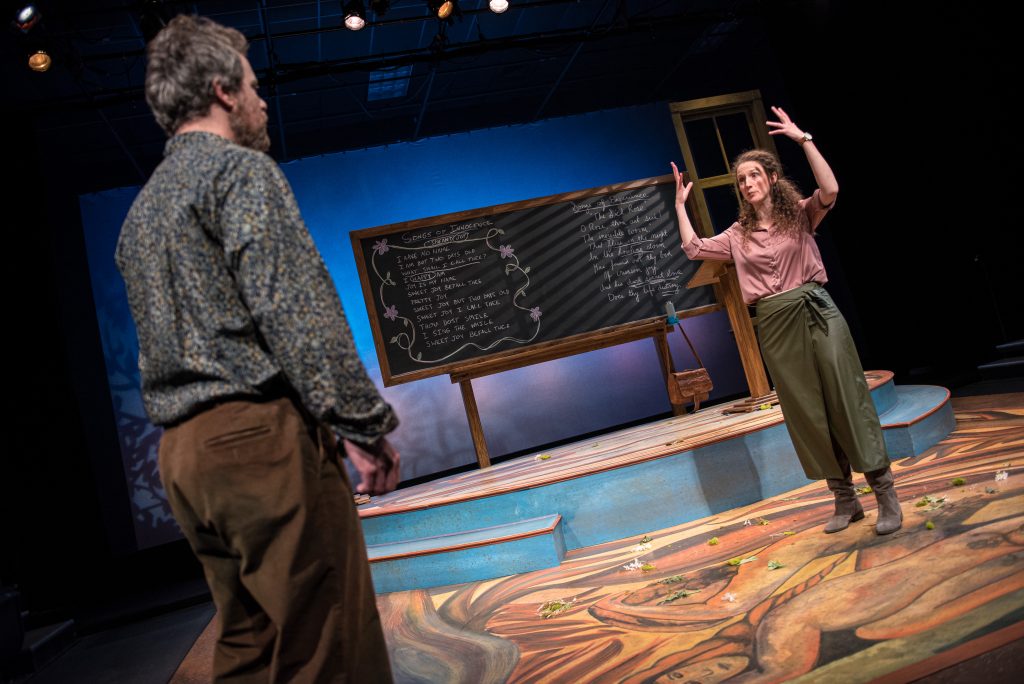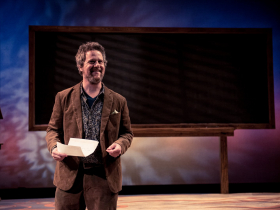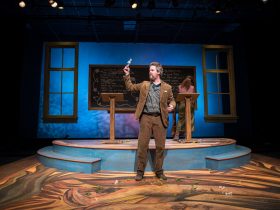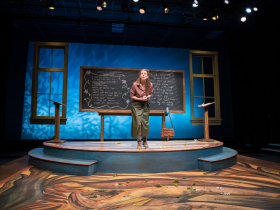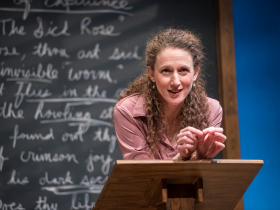The Professors Of Desire
Next Act’s fascinating show, "There Is a Happiness That Moring Is," is about sex, love, death, poetry and so much more.
Mickle Maher, one of Chicago’s influential theater operators and playwright, in 2011 fashioned an unusual and theatrically evocative play with a strangely poetic title, There Is a Happiness That Morning Is, that hasn’t got as much exposure as it deserves.
The play and the title – not to mention the Next Act Theatre program cover and the colorful floor of the set design through March 19 — were inspired by the mindset of the eccentric and influential British poet and illustrator William Blake (18th century extending into 19th century), who was one of my favorites in college literature classes.
Blake was an eccentric character whose mystical poems and attitudes about sex and politics were ahead of his time. The play is a closing gift – and there is yet another such gift ahead this season – from veteran actor-director David Cecsarini, who repeats here as he often does at Next Act as sound designer and was given a big sendoff party in December upon his official retirement. The new artistic director is Cody Estle, also from Chicago, who introduced the play on opening night.
In Happiness, the audience becomes the amused classroom as two middle aged professors at a small liberal art college, both Blake enthusiasts, explain in alternating lectures why they stripped naked in the woods and made love in front of students and everyone — and now have been ordered to apologize for their extended Blake-inspired romp.
The play is written in rhyme – masterfully disguised by the playwright, director Mary MacDonald Kerr and the two actors playing the frolicking professors, Neil Brookshireand Cassandra Bissell. We are carried into the fancies and much more as a truer morning dawns within the play.
The male professor, Bernard, thinks his sex partner’s turn at the classroom podium will fully justify his poetic carnal enthusiasm:
For sure, if pushing now comes to shove,
Yes, William Blake was a fan of free love.
The female professor, Ellen, upset by the circumstances and the interruptus of the college president, begins to change from his image of her as a totally willing partner who would never question their love:
That’s fascinating, isn’t it?
That love can die in just a flit.
In fact, she is so upset by the aftermath that this supposedly intellectually minded professor gets vulgar (in verse) and starts examining their two-decade relationship.
The play has tricky depth about poetry, love and love-making, impending death, the influence of conscience on poetry and the power of language in general. Excerpting couplets from the play do not do justice to Maher’s skill at weaving these monologues into lively emotional exchanges even though most occur in separate talks, commentaries on each other, not actual dialogue.
What the professors put on the chalkboard and analyze adds frequent meaning to the interchange.
The playwright is literally and figuratively toying with us and his principals, much as the playwright Pirandello did in forcing characters to look at their own identities and take off in outbursts from there. It is engaging in the moment though hard to explain in the aftermath.
There is almost a third play toward the end, certainly another bellowing voice to be heard from when characters suddenly interrupt each other about their basic identities. It makes for startling theater – like a bull suddenly upsetting this stage classroom, exposing the excesses of the main characters.
It also clarifies the ability of the actors. Brookshire does a valiant and quietly funny job as does the script in maintaining his moon-eyed character until near the end. It is much due to his skill that the rhymed dialogue flows so naturalistically.
Bissell as Ellen is a broader, seemingly more in control and then the more excitable character. She starts off engagingly, but slowly spins out into broader takes and sometimes false gestures and reactions, which director Kerr should have muffled.
There is a third voice, an invisible worm unmentioned in the program, but actor Mark Corkins is actually fresh from a solid turn in the Milwaukee Rep’s Much Ado About Nothing. His frenetic surprise entrance carries the finale where the play wants to go: absolute farce territory.
The ending plays havoc in a bluntly chaotic way with all the Blake-isms. By hook as well as crook it carries the audience into a randy and purely comedic conclusion.
There Is a Happiness That Morning Is
Dominique Paul Noth served for decades as film and drama critic, later senior editor for features at the Milwaukee Journal. You’ll find his blogs here and here.
Review
-
Eating Burmese in Bay View
 Dec 13th, 2025 by Cari Taylor-Carlson
Dec 13th, 2025 by Cari Taylor-Carlson
-
Casablanca Is a Milwaukee Success
 Nov 30th, 2025 by Cari Taylor-Carlson
Nov 30th, 2025 by Cari Taylor-Carlson
-
Oh, Those Witty 18th Century Brits
 Nov 24th, 2025 by Dominique Paul Noth
Nov 24th, 2025 by Dominique Paul Noth
Theater
-
Oh, Those Witty 18th Century Brits
 Nov 24th, 2025 by Dominique Paul Noth
Nov 24th, 2025 by Dominique Paul Noth
-
Skylight’s Holiday Show Is Lots of Fun
 Nov 16th, 2025 by Dominique Paul Noth
Nov 16th, 2025 by Dominique Paul Noth
-
Rep’s ‘Come From Away’ Is a Triumph
 Nov 10th, 2025 by Dominique Paul Noth
Nov 10th, 2025 by Dominique Paul Noth

